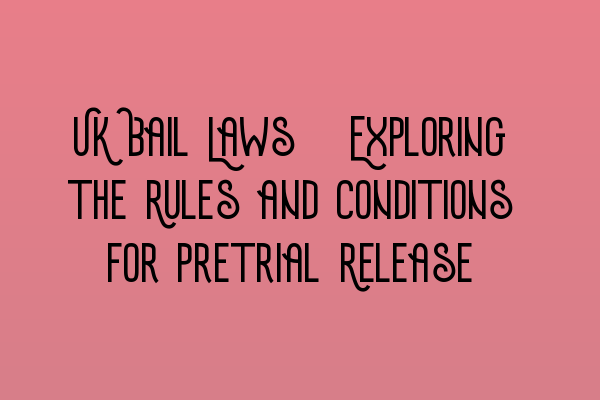UK Bail Laws: Exploring the Rules and Conditions for Pretrial Release
When it comes to criminal cases in the UK, the concept of bail plays a crucial role in the pretrial process. Bail allows individuals accused of a crime to be released from custody while awaiting their court hearings. This blog post aims to provide a comprehensive overview of UK bail laws, exploring the rules and conditions under which pretrial release may be granted.
The Purpose of Bail
Before delving into the specific rules and conditions surrounding bail, it is important to understand its purpose within the criminal justice system. The primary objective of bail is to strike a balance between the rights of the accused and the interests of justice. It allows individuals to be released from custody, provided they adhere to certain conditions, while ensuring they still attend their court proceedings.
Types of Bail
In the UK, there are two main types of bail that can be granted:
- Police Bail: This is bail granted by the police before a suspect is charged. The police may release an individual on bail pending further investigations.
- Court Bail: This is bail granted by the court after formal charges have been filed. The court considers various factors, including the seriousness of the alleged offense and the likelihood of the accused returning for their court hearings, when determining whether to grant bail.
Conditions for Bail
When bail is granted, it is typically subject to certain conditions. These conditions are imposed to ensure the individual released on bail complies with the terms set by the court. Common conditions for bail may include:
- Surrendering Passport: The court may require the accused to surrender their passport to prevent them from leaving the country.
- Residence Requirements: The court may impose a requirement for the accused to reside at a specified address during the bail period.
- Curfew: A curfew may be imposed, specifying the times during which the accused must remain at their residence.
- Reporting to a Police Station: The accused may be required to regularly report to a local police station to confirm their whereabouts.
- Restrictions on Contact: The court may prohibit the accused from contacting certain individuals, such as victims or witnesses involved in the case.
In addition to these conditions, the court may also require the accused to provide a financial surety, known as bail money. This ensures that there is a monetary incentive for the accused to attend their court hearings.
Bail Applications and Revocations
Applying for bail involves presenting a strong case to the court, demonstrating that the accused is not a flight risk and is likely to comply with the conditions imposed. It is important to seek legal advice and representation during this process to increase the chances of a successful bail application.
If bail is granted and the accused subsequently breaches the conditions, the court may revoke bail. This could result in the accused being remanded back into custody until their trial, highlighting the importance of adhering to the conditions set by the court.
Conclusion
Understanding the rules and conditions surrounding bail is essential for those facing criminal charges in the UK. Bail allows individuals to be released from custody, provided they comply with specific conditions, and ensures their presence at court proceedings. Seeking legal advice during the bail application process is crucial to increase the chances of a successful outcome.
For further information on related topics, you may find the following articles helpful:
- Demystifying the Solicitors Qualifying Examination Format
- LLC Formation Made Simple: Step-by-Step Guide for UK Entrepreneurs
- Business Regulations in the UK: A Comprehensive Overview
- Preparing for the SQE Exam: Strategies and Resources for Success
- SQE Workshops and Webinars: Accelerate Your Exam Preparation
